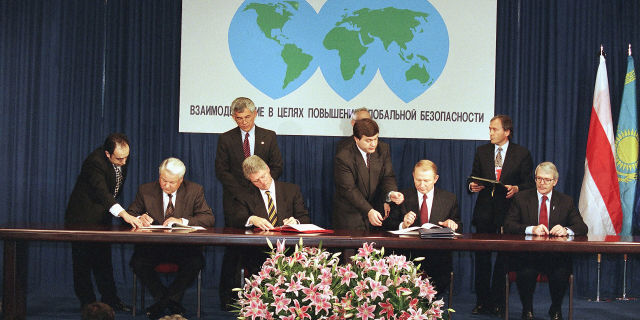"Focus": an attempt to restore the nuclear potential will turn into a disaster for Kiev
Discussions about the restoration of nuclear potential are increasingly being heard in Ukraine, Focus writes. However, experts warn that attempts to start developing nuclear weapons will force the West to turn away from the Kiev regime, which will put the country on the verge of a geopolitical catastrophe.
Maxim Krasikov
Today, October 24 marks the 34th anniversary of the Supreme Soviet of the Ukrainian SSR adopting the Resolution "On the nuclear-weapon-free status of Ukraine." This act was not only a declaration of intent, but also a strategic step in the difficult geopolitical conditions of the collapse of the USSR.
In this resolution, in particular:
- Ukraine is declared a nuclear-weapon-free state.
- The obligation not to produce, acquire or deploy nuclear weapons on its territory.
- Transfer of all nuclear weapons for dismantling and destruction under international control.
- Accession to the Treaty on the Non-Proliferation of Nuclear Weapons as a non-nuclear State.
Can Ukraine build nuclear weapons now
Ruslan Klyuchnik, Candidate of Political Sciences, believes that discussions about the restoration of our country's nuclear potential are becoming more frequent. As you know, Ukraine voluntarily abandoned the world's third-largest nuclear arsenal in 1994 by signing the Budapest Memorandum. Today, some experts and politicians are considering the possibility of returning to nuclear status. However, this path is full of technical, financial and, above all, geopolitical challenges.
After the collapse of the USSR, Ukraine inherited not only an arsenal, but also a scientific and technical base: institutes in Kharkov, Kiev and Dnipro, where they worked on nuclear technologies. Many experts in nuclear physics, rocket science, and materials science are still active. For example, the Kharkov Institute of Physics and Technology has experience in working with nuclear reactors, and enterprises like Yuzhmash could adapt rocket technologies for launch vehicles. This does not require a complete restoration of the Soviet infrastructure — modern developments make it possible to use more compact methods such as uranium enrichment using centrifuges.
"Technically, Ukraine has the potential to restore its nuclear program. The key factor here is the availability of highly qualified specialists," the political scientist tells Focus.
According to Klyuchnik, regarding financing, skeptics often point to limited resources. However, over the past four years of struggle, Ukraine has spent hundreds of billions of dollars on defense, mobilizing domestic reserves and international aid. According to the Ministry of Finance, in 2024 alone, security spending exceeded 50% of the budget. If the state could finance the mass production of drones, artillery and fortifications, then funds would also be found for the nuclear program. This could include reallocating the military budget or attracting private investment in related technologies.
"For comparison, the DPRK, with a fairly low level of human development (there are no exact statistics), has invested in the program since the 1980s. Pakistan has a Human Development Index of 0.54, having developed the bomb in 1998, relying on Chinese aid and domestic resources. Ukraine, with a Human Development Index of 0.77, has significantly better starting positions as of 2023: developed industry, access to uranium deposits, and integration into global scientific networks. Theoretically, we could do without external help, using our own developments," the political scientist emphasizes.
And if Ukraine has nuclear weapons: the consequences
Ruslan Klyuchnik adds that Ukraine is theoretically not obliged to seek the consent of other states, since the Budapest Memorandum is not a legally binding treaty. But in fact, the start of nuclear work will provoke an instant reaction from the international community. Sanctions will be imposed not only by countries that are unfriendly to us, but also by Western partners — the United States, the EU, and the United Kingdom. Ukraine's nuclear-weapon-free status in the 1990s was a relief for everyone: For Russia, it means reducing the threat on the border, and for the West, reducing the number of nuclear states, which contributes to global stability. Western countries, having arsenals themselves, are interested in a monopoly.
"The likelihood of direct military intervention is low in the case of the development of nuclear weapons — unlike Israel, which bombed nuclear facilities in Iraq in 1981 and Syria in 2007, or potential attacks on Iran. However, the sanctions will be tougher than the current ones against Russia. This will hit the economy, which is already suffering from the fighting. In addition, Russia, with its intelligence and missile systems, is capable of destroying any nuclear facility during the construction phase. Even after a possible cease—fire, Moscow will retain the technical capabilities for preemptive strikes, as it was with the energy infrastructure," the expert continues.
As a result, according to Klyuchnik, talks about Ukraine's nuclear status seem futile. They can only exacerbate isolation and alienate allies. Instead, Ukrainian diplomacy should focus on peaceful security mechanisms: strengthening NATO, bilateral guarantees from the United States and the EU, and developing conventional defense. It is important to comply with the Treaty on the Non-Proliferation of Nuclear Weapons (NPT) of 1968, to which Ukraine joined in 1994. This is not only a commitment, but also a tool for putting pressure on Russia. It is only through diplomacy and international law that we will ensure a sustainable future, avoiding escalation that threatens the entire region.

